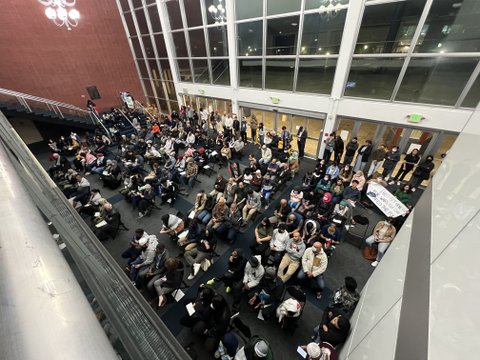
04 Mar Black Jews Face Prejudice From Multiple Angles

“Equity is about not giving everyone the same shoe size. It’s making sure that everyone has this shoe that they need so that they can walk in life without blisters and stumbling,” Rabbi Isaiah Rothstein said. (Screenshot captured by Julia Métraux for CC Pulse)
By Julia Métraux
Black Jews have to face not only antisemitism, but also anti-Black racism, which can come from other Jewish people.
That was one of many takeaways from the Feb. 29 panel hosted by My Jewish Learning with Black Jewish leaders talking about what it is like to hold these multi-marginalized identities. The panel was moderated by University of California, Davis professor Bruce Haynes, author of the book “The Soul of Judaism: Jews of African Descent in America.”
Black Jews are believed to be undercounted, according to the Jews of Color initiative. As briefly touched on in the panel, it is also harmful to consider Black Hebrew Israelites, also known as Radical Hebrew Israelites, to be Black Jews. The Southern Poverty Law Center says that this group, “appropriate[s] biblical Jewish heritage to claim an exclusive identity as the true chosen people of God and decry Jews as the impostors and thieves.”
“If we talked about nothing else in this entire forum, and we’re talking about the whole world situation, and particularly Israel and Gaza, and the whole fallout to everything, what is missing is empathy,” said Robin Washington, The Forward’s editor-at-large, who has written on the experiences of Black Jews.
All Jews, whether Jews of color or white Jews, are the targets of antisemitic white supremacists. When white Jews emigrated from Eastern Europe at the turn of the 20th century, many were not considered white. But this does not mean they have the same experience as Jews of color, says Ilana Kaufman, CEO of Jews of Color Initiative.
“The United States offers a social construct that rewards people who can blend into whiteness, and then when you look around and look at the experiences of Black people and people of color in this country, there’s an incredible disincentive to see white privilege,” Kauffman said.
Panelists also touched on diversity, equity and inclusion — collectively known as DEI — which some white Jews claim does not include the experiences of Jewish people. Attacks on DEI, including in an article in the Jewish publication Tablet Magazine, increased after the Oct. 7 Hamas-led attack on Israel.
Yolanda Savage-Narva, Union for Reform Judaism’s assistant vice president of racial equity, diversity and inclusion, notes that it is crucial to not lose sight that DEI is rooted in the fight for the rights of Black people. “It was really an opportunity to operationalize the things that have been put in place through the Civil Rights Act and the Voting Rights Act,” Savage-Narva said.
Ensuring equity among people is also a Jewish value — even before the term DEI was created — according to Rabbi Isaiah Rothstein, founder of Jewish Federations of North America’s initiative for Jewish equity, diversity and inclusion.
“Equity is about not giving everyone the same shoe size. It’s making sure that everyone has this shoe that they need so that they can walk in life without blisters and stumbling,” Rothstein said. “Since the times of Abraham, these have been key to remind us of the people who need us.”
Some white Jews have been leaders in attacking DEI, Washington says. “Stephen Miller is out there suing anybody who has a program that even begins to mention it, so we need to police our own as Jewish people,” he said, referring to the former Trump senior advisor, who was the architect behind many anti-immigrant policies when Trump was in office. Miller’s own uncle called him a hypocrite for his statements on chain immigration, as that is how their family members entered the United States.
Grappling with racism in Jewish institutions is also an important step to make Jews of color feel more welcome and want to attend religious services and events, the panelists said
“Our institutions don’t reflect that diversity and that might be why you haven’t spent much time with Jews of color,” Rothstein said. “Often, the spaces in which we would like to be in a celebratory, multiracial space is not often conducive, where people are experiencing microaggressions.”
Some of these microaggressions include assuming a Jew of color is a convert because they are not white.
To learn more about the Jews of Color Initiative organization, people can visit the website jewsofcolorinitiative.org.
This resource is supported in whole or in part by funding provided by the State of California, administered by the California State Library in partnership with the California Department of Social Services and the California Commission on Asian and Pacific Islander American Affairs as part of the Stop the Hate program. To report a hate incident or hate crime and get support, go to CA vs Hate.





No Comments